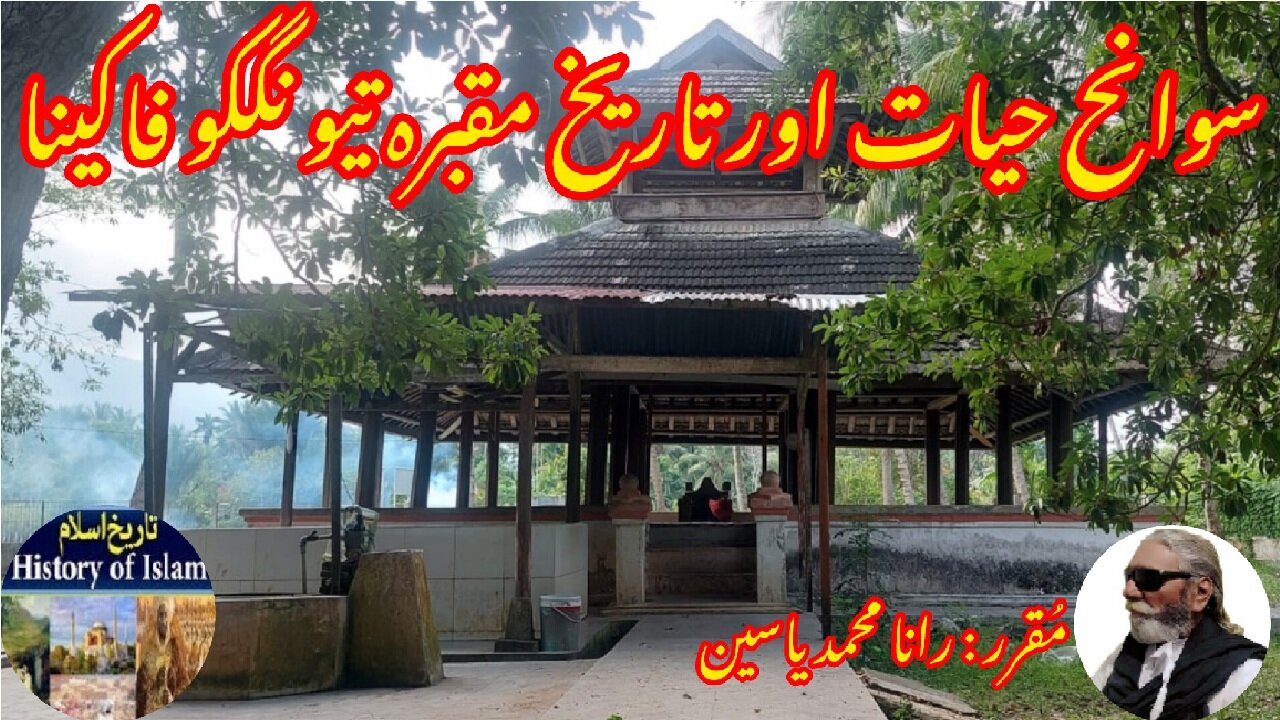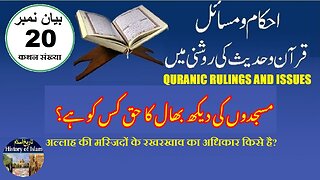Premium Only Content

History of Tiangko Fakinaki biography and the shrine تیونگکو فاکیناکی سوانح حیات اور مزار کی تاریخ
@islamichistory813 #teungkufakinah #sufisaint #cultural #heritage #biography #islamic #mysticism #islamic #philosophy #shrine #historical #figures
Biography of Teungku Fakinah and the history of his shrine
Dekhti Aankhooon aur sountay kaanoon ko Asslamoalaikum, sisters, brothers friends and elders, in informative series videos of Islamic Women ascolars, sufisaints, cultural heritages, islamic philosophys, islamic mysticisms and historical women figures. today we are describing biography of Teungku Fakinah and the history of his shrine.
Teungku Fakinah (1856 – 10 October 1940) was a distinguished Acehnese woman whose life was marked by her deep Islamic scholarship and her role as a fierce warrior during a time of significant political upheaval in Aceh, Indonesia. Born in 1856 in Aceh, a region in the northern part of Sumatra island, Teungku Fakinah was raised during an era when Aceh was a strong and independent sultanate, fiercely resisting Dutch colonial attempts to conquer it. Aceh’s resistance was one of the longest and most brutal during the Dutch colonial expansion, and Teungku Fakinah's life and actions were intricately connected to the tumult of this resistance.
Teungku Fakinah's full name is sometimes recorded as Teungku Fakinah binti Teungku Mohd, with the honorific "Teungku" signifying her status as a religious leader or scholar in Aceh's Islamic community. She came from a religious family, which laid the foundation for her future role as both a scholar and a fighter for her people's freedom. Growing up in the shadow of the ongoing conflict with the Dutch colonial forces, Teungku Fakinah was deeply influenced by the Islamic principles of justice and resistance, which were a core part of Acehnese culture.
Her early education was grounded in traditional Islamic studies, and she became well-versed in the teachings of the Quran and Hadith, as well as Islamic jurisprudence (fiqh). This deep connection to Islamic scholarship was not only a personal endeavor but also tied her to her community's broader struggle against colonialism. Aceh was a center of Islamic learning and had produced many renowned scholars over the centuries. Teungku Fakinah's scholarship was notable not just for its depth, but also for her ability to combine spiritual and military activism in a manner that was unique for women in her time. She was one of the few women in the region who achieved recognition as both a learned scholar and a capable fighter, with an ability to inspire both men and women in her community.
During the Aceh War (1873–1914), which was a protracted struggle between the Acehnese people and the Dutch colonial forces, Teungku Fakinah took an active role in leading resistance efforts. As a female warrior, her participation in the war defied the gender norms of her time, and she became an iconic figure in the resistance movement. She is said to have participated in combat, trained other women to fight, and supported the logistics of the Acehnese forces. In addition to her military contributions, Teungku Fakinah’s role as a scholar helped to unite the people in the ideological battle against Dutch imperialism. She taught many followers about the moral and religious justifications for resisting colonial forces, emphasizing the religious duty of defending one’s homeland and upholding justice.
Teungku Fakinah was not only a scholar and warrior, but also a powerful symbol of female strength and leadership in the Acehnese community. Her leadership transcended her military activities and extended to her role as a spiritual guide. She was highly respected by her peers, both men and women, for her intellectual prowess and her devotion to the Islamic cause. Her work in spreading Islamic teachings, particularly related to social justice and resistance, was deeply influential in the context of the ongoing war against Dutch colonialism.
She lived through much of the intense conflict of the Aceh War and continued to be a guiding figure for her people even after the Dutch had largely gained control over the region by the early 20th century. Teungku Fakinah's influence persisted long after the formal end of the conflict, and she became a symbol of Acehnese resistance and Islamic scholarship.
Teungku Fakinah passed away on 10 October 1940, having lived a long and impactful life. Her death marked the end of an era for many in Aceh, as she had been one of the last remaining figures of the generation that had actively fought against Dutch colonialism. She was deeply mourned by her community, who saw her as a revered scholar, a warrior, and a protector of Aceh’s religious and cultural heritage.
After her death, Teungku Fakinah was buried in her hometown in Aceh, where her tomb became a site of pilgrimage for those who admired her contributions to Islamic scholarship and resistance. Her grave is located in the village of Ulee Lheue, a place that is still visited by many who wish to pay homage to her memory. The shrine where she is buried is modest, but it is of great significance to the people of Aceh, especially those who remember her role in the resistance against colonial oppression. Over time, the shrine has become a symbol of both the spiritual and militant history of Aceh, representing the convergence of Islamic scholarship, cultural pride, and resistance against foreign domination.
The shrine of Teungku Fakinah was not officially built by a specific individual but became a focal point for the community after her death, as her influence continued to resonate deeply in the region. Her legacy, however, was not just about her military exploits or her scholarly works; it was also about the deep connection she forged between religion, gender, and resistance. Her life remains an important chapter in both the history of Aceh and the broader context of Islamic women’s roles in colonial resistance movements. Teungku Fakinah’s shrine serves as a reminder of the strength, resilience, and scholarship of a remarkable woman who played a pivotal role in the defense of her people and her faith during one of the most difficult periods of their history.
With this, we ask for your permission until tomorrow, and tomorrow we will be described biography of Aisha Abd al-Rahman and history of her shrine, at the end we pray to Allah Almighty to grant us the abilitty to act on the Quran and Hadith, Amen
Allah Hafiz
=============================
-
 7:28
7:28
ISLAMIC HISTORY
7 hours agoWho Has the Right to Maintain the Mosques of Allah اللہ کی مساجد کی دیکھ بھال کا حق کس کو ہے؟
3 -
 LIVE
LIVE
Total Horse Channel
19 hours agoAMHA World Show 2025 9/21
680 watching -
 1:29:02
1:29:02
Game On!
1 day ago $6.95 earnedTHEY'RE BACK! NFL Wise Guys Return For Week 3 BEST BETS!
47.3K4 -
 6:16
6:16
China Uncensored
4 hours agoHow Trump Plans on Stopping Russia and China—Without Firing a Shot!
123K39 -
 33:13
33:13
Ohio State Football and Recruiting at Buckeye Huddle
16 hours agoOhio State Football: 10 Things We Learned Watching Washington's Win over Colorado State
65.8K -
 1:14:04
1:14:04
NAG Entertainment
17 hours agoKickback w/ Leon - Rocket League: Road to GC
47.2K -
 30:13
30:13
Degenerate Plays
4 hours ago $0.60 earnedBritish Insults Are Hilarious - Call of Duty: Modern Warfare 2 (2009) : Part 2
27.3K2 -
 6:42
6:42
NAG Daily
21 hours agoCharlie Kirk: His Words. His Vision. His Movement.
48.6K27 -
 21:42
21:42
Jasmin Laine
22 hours ago“Kimmel Isn’t a Victim, Charlie Kirk Was”—Gutfeld OBLITERATES Liberal Media Over FAKE Outrage
45.2K34 -
 33:59
33:59
ComedyDynamics
23 days agoBest of Jim Breuer: Let's Clear the Air
88.4K20